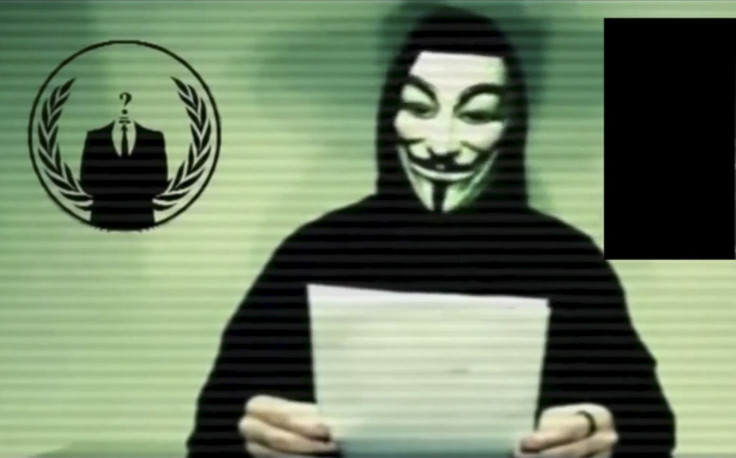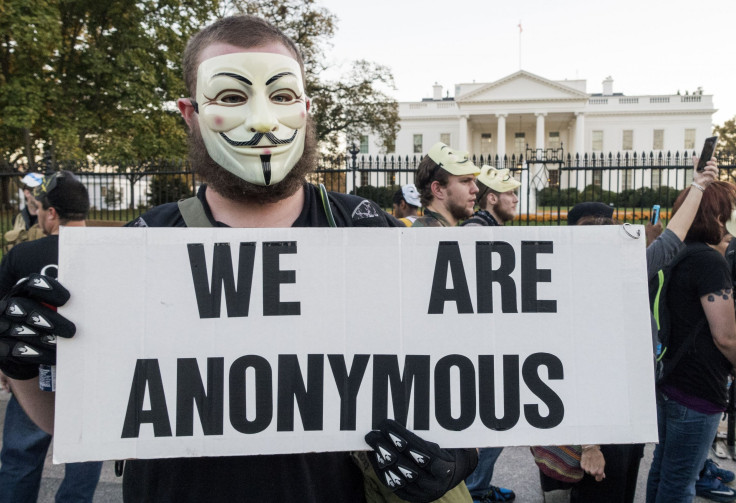Anonymous Is Hacking ISIS, But Warns Collaborating With US Government Is 'Deeply Stupid'

The hacking collective Anonymous is battling ISIS online, but one of its most important voices has warned members that collaborating with the U.S. war on terror would be "deeply stupid." The shadowy group issued a statement distancing itself from an offshoot, Ghost Security Group, which has been reportedly supplying the U.S. government with information about the Islamic State group in exchange for payments.
The statement, which came from the highly influential @YourAnonNews Twitter account (1.6 million followers), included a thinly veiled criticism of Ghost Security Group: "We think it’s great if people want to hack ISIS and publish their secrets," the group said. "But engaging in social media censorship campaigns and dealing with intelligence contractors and government agents is deeply stupid. The former will contribute to legitimize the spread of internet censorship and will lead to the increased censorship for everyone, including Anonymous."
#OpISIS - A message from Anonymous and friends https://t.co/egHYlkMWBg
— Anonymous (@YourAnonNews) December 13, 2015The statement goes on to say that close relationships with government agents will result in many more informers within Anonymous as well as damaging the group’s reputation ”as it will lead to a view that Anonymous is too close to U.S. intelligence interests.”
'Naive Fools'
This view is echoed by onetime Anonymous hacker Jeremy Hammond, who is serving a 10-year prison sentence for his part in a 2011 cyberattack on global intelligence-gathering company Stratfor. “The naive fools behind the operation are being manipulated by intelligence agents taking advantage of the emotional reaction to the Paris attacks to harness our skills to fight their hypocritical 'war on terrorism,'” Hammond wrote on his blog this week.
It's questionable whether the reputation of Anonymous would be sullied by links to GhostSecGroup. Most people still view Anonymous as a defined group of nerds and anarchists who never leave their bedrooms, more web trolls than sophisticated hackers. The truth is that the group is a very loose collective that operates under the Anonymous banner. There are multiple pockets of Anonymous around the world, each with its own distinctive ideas and operations. This leaderless structure leads to infighting and divisions, and as a result of media reports quoting Anonymous as a single entity, this only exacerbates problems among members.
In the wake of the Paris terror attacks last month, the collective declared war on Islamic State group -- also known as ISIS, ISIL, IS or Daesh. This isn't the first time Anonymous has “declared war” on a particular group or individual, but given the huge interest in ISIS in the wake of the attacks, it has been the most widely covered campaign to date.
Ghost Security
Operation Paris (or OpParis), as the campaign was called, was part of a wider campaign against ISIS that kicked off earlier this year with the goal of disrupting the group’s online propaganda machine. The main thrust of the campaign was to identify social media accounts associated with ISIS and get them taken offline. While many associate Anonymous with hacking, these campaigns are more about research and collecting data than they are about cyberattacks.

Operation ISIS (or OpISIS) was initiated by a group called Ghost Security (GhostSec) and following some high-profile successes, the U.S. government allegedly approached the group to get access to the information it had collected. The group supplied this information willingly, but soon the relationship changed significantly. According to reports, some members of GhostSec asked for money in exchange for the intelligence being provided to the government — and the government agreed.
Wildly Inaccurate
This led to division within the group and all but two of the original members left. In a bid to distinguish itself from the original entity, the group renamed itself Ghost Security Group (GhostSecGroup) and continued to recruit members to help boost the amount of money earned by the group. GhostSecGroup calls itself “a counterterrorism network that combats extremism on the digital front lines of today using the internet and social media as a weapon,” and it has developed close ties with Michael Smith, an adviser to the U.S. Congress and co-founder of national security firm Kronos Advisory. He backs up the group’s claims that they have helped prevent threats against New York and Tunisia.
The hacktivist collective has come in for criticism from many others who claimed Anonymous’ tactics were actually harming the collection of intelligence about ISIS and having little to no impact on the extremist group’s ability to spread its message. Twitter said that lists of suspected ISIS accounts compiled by Anonymous and supplied to the company were “wildly inaccurate” and contained many journalists and academics. This criticism increased in recent weeks as Anonymous’ actions drew attention in the wake of the Paris attacks.
The inherent structure of Anonymous means that issues like this will continue and as @YourAnonNews points out, it doesn't speak for the whole of the movement, but it believes that being open is crucial to the continued success of the group. "Any attempts to act in secrecy, supporting political or governmental organizations, will be discouraged by us or completely ignored to safeguard our allies and supporters fighting for openness and transparency within governments, dictatorships and organizations around the globe that control various aspects of our lives."
© Copyright IBTimes 2025. All rights reserved.




















